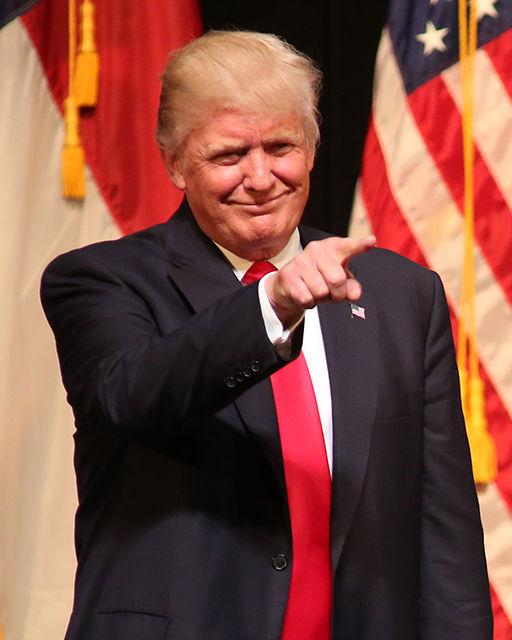With early voting beginning on Thursday, the following voting guide provides summaries and viewpoints of candidates listed on the ballot.
The candidates in this guide are taken from the sample ballot of a student living on NC State’s campus. Even if you live on or near campus, however, your ballot may be different. To view your sample ballot, check the NC Public Voter Search.
In most cases, the policy positions listed here are taken from the candidates’ websites or formal proposals. Other information comes from interviews conducted by other news outlets, as well as statements made during public debates. For the sake of transparency, the online version of this article includes hyperlinks to the associated information.
In an effort to minimize bias, the candidates are listed in the same order in which they appear on the ballot and issues are listed alphabetically.
President of the United States
Donald Trump and Mike Pence (Republican)
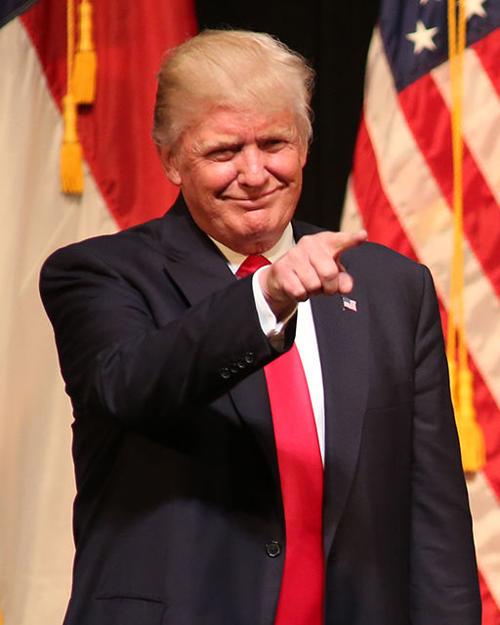
Famous for his businesses and role on “The Apprentice,” Donald Trump has defied early predictions by many political commentators that he wouldn’t last long in the race. Running on the basis of being a negotiator, Trump claims that he would run the government like a business. If elected, Trump would be the oldest newly elected president (Ronald Reagan currently holds the record).
Mike Pence, elected governor in 2012, is a six-term Indiana congressman. Pence is mostly known for his social conservatism and pro-life stance. Last year, he signed a religious freedom law that critics claim is discriminatory toward same-sex couples.
Major Points:
Trump has proposed a wall on the Mexican border, to supposedly be paid for by Mexico, as well as a temporary shutdown on Muslim people entering the country.
Donald Trump is the first presidential candidate of a major party in recent history to not release his tax returns, claiming not to do so because he is under audit by the IRS. The audit does not legally prevent him from releasing the tax returns.
Trump has lately been drawing criticism for a 2005 recording in which he made sexually predatory comments about women, saying he could get away with these actions due to his stardom. The Trump campaign has dismissed the conversation as “locker room talk,” but that has not stopped the withdrawal of support from many Republican leaders.
On the Issues:
Abortion: Both Trump and Pence are pro-life candidates and support the defunding of Planned Parenthood. Trump has said there needs to be a form of punishment for women who have abortions. Pence, in 2011, voted in favor of banning federal health coverage that includes abortions.
Defense: Increase number of active soldiers and size of the Navy, place emphasis on cyber warfare.
Education: Supports increasing federal funding for school choice by relocating existing funds, giving states the option to choose whether funds will be distributed to private schools.
Gun Control: Endorsed by NRA, opposes limits and infringements on the Second Amendment.
Health Care: Repeal the Affordable Care Act, known as Obamacare, and remove legal barriers preventing some insurers from selling across state lines.
Filling the Supreme Court Vacancy: Plans to nominate someone with similar views as former Justice Antonin Scalia, a staunch conservative who passed away in February. In an unusual move, the campaign has released a list of potential justices.
Hillary Clinton and Tim Kaine (Democrat)
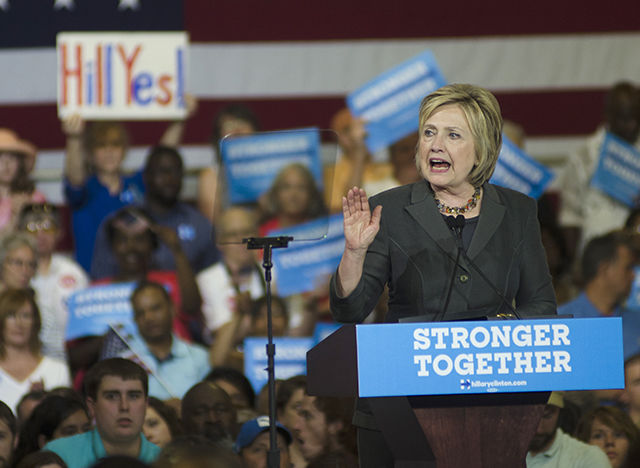
Hillary Clinton, formerly the secretary of state under the Obama administration, has had a long career in government. If elected, Clinton would be the first female president.
Tim Kaine, like Clinton, has spent a long time in the public eye. Kaine, who has served as a mayor, governor and U.S. senator, has long been an advocate for education reform. His career has been shaped in part by how he responded, as governor of Virginia, to the Virginia Tech shooting in 2007.
Major Points:
Clinton has had a strong focus on continuing the work and policies of the Obama administration. Notably, she wishes to keep the Affordable Care Act, seeking to amend the law rather than repeal it. President Barack Obama has endorsed the Clinton/Kaine ticket.
Clinton has faced scrutiny for her use of a private email server while Secretary of State, including an investigation by the FBI and an 11-hour congressional hearing. The director of the FBI, James Comey, has called her treatment of classified information as “extremely careless” but recommended against criminal charges.
On the Issues:
Abortion: Endorsed by Planned Parenthood, Clinton is a pro-choice candidate who seeks to strengthen access to contraception, preventive care and abortions.
Education: Clinton plans to eliminate tuition for families making under $125,000 and offer free tuition at community colleges.
Gun Control: Clinton seeks to expand background checks, removing internet and gun show loopholes. She believes people on the “no-fly list” should not be able to purchase guns. Following the Virginia Tech shooting in 2007, Kaine, then governor of Virginia, created an executive order that prevented people declared dangerously mentally ill from purchasing firearms.
Health Care: Expanding the Affordable Care Act has been a critical point of Clinton’s campaign. She also wishes to allow those over 55 to buy into Medicare and double funding for community health centers.
Filling the Supreme Court Vacancy: Should she win the election, it is unclear who Clinton would nominate to fill the vacancy in the Supreme Court. Unlike Trump, she has not released a potential list of nominees. However, her votes against confirming John Roberts in 2005 or Samuel Alito in 2006 could offer some insight on the types of justices she would not nominate.
Gary Johnson and William Weld (Libertarian)
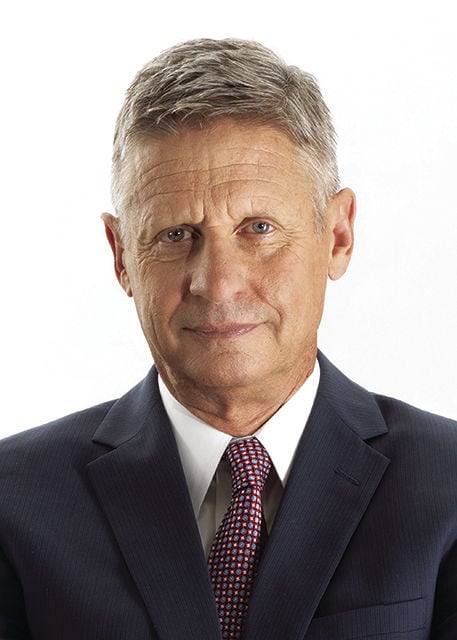
Gary Johnson, former governor of New Mexico, leads the Libertarian ticket with many Americans unaware of his positions. Due to low numbers in national polls, Johnson has been unable to participate in presidential debates. Johnson is a strong proponent of small government and fiscal conservatism while stressing some socially liberal ideals.
William Weld was elected governor of Massachusetts in 1990 and 1994 and has served as the national co-chair of U.S. Term Limits and of the United States Privatization Council.
On the Issues:
Abortion: While personally opposed to abortion, Johnson believes the government should not interfere with the decision of whether to have an abortion. As governor of New Mexico, he supported a ban on late-term abortions.
Education: Johnson believes in the elimination of the Department of Education, saying that state and local governments should have more control over education.
Gun Control: Johnson is a supporter of Second Amendment rights and has claimed that, if more guns were readily available, Americans would be safer.
Health Care: In favor of free market alternatives, Johnson is opposed to the Affordable Care Act.
National Defense: Johnson is opposed to involving U.S. military forces in regime change and other forms of action to solve problems in other nations, saying that doing so creates more enemies.
Supreme Court Nomination: Johnson has announced his potential Supreme Court nominees to be law professors Jonathan Turley of George Washington University and Tom Campbell of Chapman University.
North Carolina Governor
Pat McCrory (Republican)
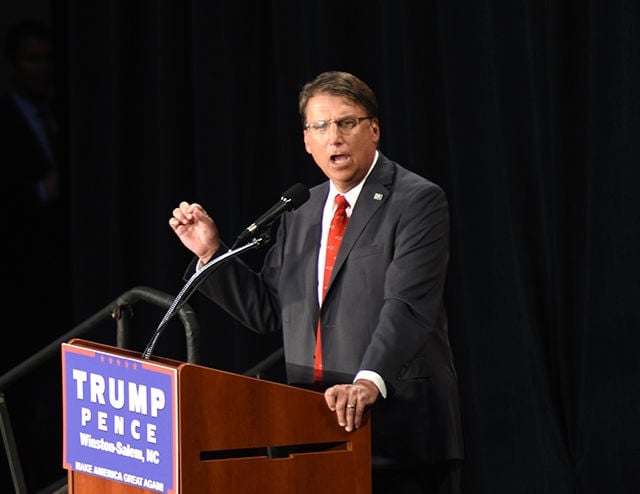
Incumbent Gov. Pat McCrory, a graduate of Catawba College, was first elected mayor of Charlotte in 1995, where he served seven terms. Over the past several months, McCrory’s campaign has been characterized by the fallout of House Bill 2, a law signed in March that many say is discriminatory against the LGBT community.
On the Issues:
House Bill 2: McCrory has long defended the law, often highlighting how the bill allows businesses to choose which of their restrooms people may use.
Education: Worked to increase pay for some teachers and cut tuition at three universities in UNC System
Taxes and Economy: As governor, has reduced state income taxes and decreased corporate tax rates.
Teacher Pay: While McCrory has been governor, average teacher pay has risen to more than $50,000. Some have criticized the pay raises for not going far enough, but McCrory has said he wants to do more to further this effort.
Voting Laws: McCrory favors photo ID requirements to vote and disagrees with the recent federal Court of Appeals ruling, which struck down North Carolina’s voter ID law on the basis that it unfairly targeted African-Americans.
Roy Cooper (Democrat)

Elected as attorney general in 2000, Roy Cooper has had a strong focus on reducing crime in the state. Cooper has also served in the NC House and Senate and graduated from UNC-Chapel Hill as a Morehead Scholar.
On the Issues:
House Bill 2: Cooper is strongly opposed to HB2, and as attorney general, refused to defend the law, citing its discriminatory policy.
Education: Cooper opposes vouchers, saying they drain money from public schools, and wants to “manage the number of charter schools.”
Taxes and Economy: Opposed to large tax cuts for income and corporate taxes, Cooper focuses on closing the skills gap and improving infrastructure.
Teacher Pay: Cooper wishes to reinstate a teaching fellows program and increase teacher pay.
Transportation bond: Cooper supports the transportation bond, citing low interest rates and a growing population.
Voting Laws: Cooper opposes voter ID laws, favoring same-day voter registration and the allowance of online voter registration.
Lon Cecil (Libertarian)

Lon Cecil, who has a Bachelor of Science in electrical engineering from Oklahoma State University, was drafted into the U.S. Army in 1969 and has a 25-year career as an application engineer. He first ran for an elected position in the 2010 NC District 12 of the U.S. House race.
On the Issues:
House Bill 2: Cecil supports the repeal of HB2, saying the problems the law sought to solve did not warrant legislative action.
Education: Cecil wants to remove regulations from private education and allow as much school choice as possible.
Taxes and Economy: Cecil has called for the removal of taxes on all agricultural products and believes that “the costs of government should be paid for by voluntary means only,” according to his campaign’s website.
Voting Laws: Citing the dominance of the two-party system, Cecil proposes shifting away from the current voting system toward a system with opportunities for write-in votes and instant runoff voting.
United States Senate
Richard Burr (Republican)
Richard Burr, a second-term U.S. senator, is the chairman of the U.S. Senate Select Committee on Intelligence and has served five terms in the U.S. House.
On the Issues:
Abortion: In 2008, Burr voted to make it illegal for minors to cross state lines for abortions. In 2007 he voted to bar grant money from being given to organizations that perform abortions.
Economy: Burr seeks increased tax reform and an end to tax loopholes for special interests.
Education: Burr has fought against Common Core and No Child Left Behind, claiming that education decisions should be left more to parents, teachers and local governments.
Health Care: Burr opposes the Affordable Care Act, instead favoring the Patient CARE Act, another health care plan that includes less federal control.
Deborah Ross (Democrat)
Deborah Ross, who served in the NC House from 2003 to 2013, taught law at Duke University. Ross received her law degree from UNC-Chapel Hill and was formerly the executive director of the American Civil Liberties Union of North Carolina.
On the Issues:
Abortion: Endorsed by Planned Parenthood, Ross advocated for pro-choice policies while she was a member of the NC House.
Education: Ross seeks to expand early learning and pre-school access and has supported measures to put more state lottery funds toward education.
Economy: Ross supports measures for equal pay. While in the NC House she introduced legislation to prevent employers from paying employees different amounts based on gender.
Health Care: While Ross generally supports the Affordable Care Act, she believes it contains faults and should continue to be amended.
Sean Haugh (Libertarian)
Sean Haugh, the Libertarian nominee, has represented the Libertarian Party in 2002 and 2014. Haugh currently works as a pizza delivery man.
On the Issues:
Abortion: Haugh believes abortion should remain legal, saying that criminalizing abortion increases death and suffering.
Drugs: Haugh believes that, in order to solve problems with addictions, the U.S. needs to legalize all drugs and repeal restrictions on pain medications.
Economy: Despite working a minimum wage job, Haugh opposes the minimum wage, calling it a Band-Aid that offers no cure.
US House of Representatives District 4
Sue Googe (Republican)
Sue Googe, an entrepreneur and first-generation Chinese immigrant, stands in opposition to big government. She has worked as a software engineering contractor and founded a real estate investment company in Cary.
On the Issues:
Defense: Googe has a “peace through strength” approach to national defense, saying that the national debt is a threat to the nation’s security.
Education: Promoting a more choice-based approach to education, Googe endorses an increase in teacher pay and an elimination of Common Core.
Energy and environment: Googe seeks to make U.S. energy independent, stressing renewable energy and environmental protections.
Healthcare: Googe supports replacing the Affordable Care Act with a single-payer system.
Immigration: Googe seeks to increase enforcement of current immigration laws before creating new laws on the issue.
Term Limits: Googe supports term limits for congressmen, saying there should be a 3-term limit in the U.S. House and a 2-term limit in the U.S. Senate.
David Price (Democrat)
Incumbent Representative David Price serves on the House Appropriations Committee, and is the ranking Democrat on the Transportation, Housing and Urban Development Appropriations Subcommittee.
On the Issues:
Budget: While serving on the House Appropriations Committee, Price has supported increased investments for education and infrastructure.
Education: Through the Advanced Technological Education program, Price has promoted technological teaching at community colleges. He is also looking toward reforming “No Child Left Behind.”
Gun control: Price, who is the vice chair of the House Democrats’ Gun Violence Prevention Task Force, has called for bans on assault weapons and high-capacity magazines, as well as an expansion of background checks and mental health services.
Housing: As the senior Democratic member of the House Appropriations Subcommittee for Transportation and Housing and Development, Price promotes programs for affordable housing, homeownership and community development.
NC State has an on-campus early voting location at the Creative Services Building located at 1220 Varsity Drive. Students may take the No. 5 Varsity bus, get off at the McKimmon Center and walk a short distance to the polling place, according to an email from Mia Connell, a Student Government senator and a sophomore studying management.
The polling place will be open from Oct. 27 until Nov. 5 and will be open from 9 a.m. to 7 p.m. on weekdays. For other early voting locations consult the Wake County Board of Elections’ website. If you have not registered to vote, you may do so with same-day voter registration, so long as you participate in early voting.
On Election Day, most students will have Pullen Community Center as their polling place. However, it is still important to double check the polling place listed on your voter registration.
Election Day is on Nov. 8, and polling places will be open from 6:30 a.m. to 7:30 p.m.
NC House Bill 2, signed by incumbent Gov. Pat McCrory in March, has been widely criticized for allowing discrimination against the LGBT community. Its defenders say the law protects from invasions of privacy caused by men going into women’s restrooms.
However, HB2 is about more than bathrooms. The law prevents members of the LGBT community from having legal recourse over discriminatory firings.
The law also prohibits cities and counties in North Carolina from creating their own minimum wages.
“One-half percent (1/2%) local sales and use taxes, in addition to the current local sales and use taxes, to be used only for public transportation systems.” This is the wording of the sales tax referendum that will be on the ballot for all Wake County residents.
The tax increase will go to help finance a new transit system connecting the Triangle area with new buses and trains. If passed, the new tax would cover about $1 billion of the project’s cost.
Wake County residents currently pay 6.75 cents in sales tax per dollar, with the county getting 2 cents of that.
The new transportation initiatives will provide better public transit services in highly congested areas of the Triangle such as NC State, UNC-Chapel Hill, Research Triangle Park and Duke University.
If the referendum does not pass, the bill could die before being enacted.
Republican Donald Trump is running for president of the United States.



